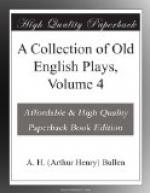[172] See my remarks in the Introduction.
[173] So the old ed. The metrical harshness may be avoided by reading “And by this sword and crownet have resign’d” (or “And by this coronet and sword resign").
[174] Owns.
[175] Old ed. “Gorges.”—I suppose there is an allusion, which must not be taken too literally, to the story of Candaules and Gyges (see Herodotus, lib. i. 8).
[176] This is the unintelligible reading of the old ed.—“This action, sure, breeds” &c., would be hardly satisfactory.
[177] Lucian tells a story of a youth who fell in love with Praxiteles’ statue of Aphrodite: see Imagines, Sec. 4. He tells the story more elaborately in his Amores.
[178] Concert.
[179] Old ed. “denie.”
[180] Before this line the old ed. gives the prefix “Val.” Perhaps a speech of Montano has dropped out.
[181] Old ed. “although no a kin.”
[182] Old ed. “light fall soft.” Probably the poet originally wrote “light,” and afterwards wrote “fall” above as a correction (or “light” may have been caught by the printer’s eye from the next line).
[183] Doorkeeper was a common term for a pander.
[184] Skin.
[185] Old ed. “crowne.”—My correction restores the sense and gives a tolerable rhyme to “heare.” Cf. p. 262.
“And in this Chaire,
prepared for a Duke,
Sit, my bright Dutchesse.”
[186] Old ed. “Exit.”
[187] Old ed. “have her honour.”
[188] In the Parliament of 1601 Sir Walter Raleigh and others vigorously denounced the exportation of ordnance. See Townshend’s Historical Collections, 1680, pp. 291-5.
[189] “Letters of Mart” = letters of marque.
[190] Old ed. “now.”
[191] Old ed. “when.” ("Then” = than.)
[192] Old ed. “good.”
[193] Old ed. “this dissemblance.”
[194] See note [50].
[195] Old ed. “esteem’d.”
[196] “Open ... palpable ... grosse ... mountaine.” The writer had surely in his mind Prince Hal’s words to Falstaff:—“These lies are like their father that begets them: gross as a mountain, open, palpable.”
[197] Old ed. “Of Lenos mathrens.” I have no doubt that my correction restores the true reading. Cf. above “Panders and Parasites sit in the places,” &c.
[198] Quy. “On, friends, to warre”? Perhaps something has dropped out—“Urge all our friends to warre.”
[199] Old ed. “dishonour’d.”
[200] Not marked in old ed.
[201] This speech is not very intelligible, but I can only mend it by violent changes.
[202] Old ed. “payes all.”
[203] Old ed. “of this spatious play.”
[204] Crack.
[205] Old ed. “sould.”
[206] Old ed. “are.”




